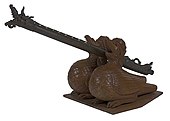Pakayun
Appearance
| Pakayun | |
|---|---|
 A late 19th century Pakayun sword. | |
| Type | Sabre sword |
| Place of origin | Borneo (Brunei; North Kalimantan, Indonesia; Sabah, Malaysia) |
| Service history | |
| Used by | Dayak people (Murut people), Orang Ulu (Lun Bawang) |
| Specifications | |
| Length | approximately 80–90 cm (31–35 in) blade |
| Blade type | Single edge |
| Hilt type | Wood with brass ferrule |
| Scabbard/sheath | Wood |
The Pakayun (as it is called among Malay speaking Muruts) or Parapat (as in Murut language)[1] or Pelepet / Felepet (by the Lun Bawang / Lundayeh people)[2] is a sword very characteristic of the Murut people originating from Borneo.[3]
The Pakayun is a Sabre sword with a light curved blade and has a curious forked pommel.[4] The blade is of almost uniform diameter throughout with its back shorter than the edge, so that there is a short slope at the tip of the blade.[5]

See also
[edit]References
[edit]- ^ The Sarawak Museum Journal: Volume 4, Issues 12-15. The Gouvernment Printing Office, Kuching Sarawak. 1937. p. 230. OCLC 1227337846.
- ^ Haslina Bujang (27 October 2018). "Senjata Tradisional Lun Bawang Yang Hilang – Felepet". The Patriots. Retrieved 2023-09-05.
- ^ "American Anthropological Association, Anthropological Society of Washington (Washington, D.C.), American Ethnological Society". American Anthropologist: Volume 4. American Anthropological Association. 1902. p. 557. OCLC 51205515.
- ^ George Cameron Stone (2013). A Glossary of the Construction, Decoration and Use of Arms and Armor: In All Countries and in All Times. Dover Publications. p. 479. ISBN 978-04-861-3129-0.
- ^ Royal Anthropological Institute of Great Britain and Ireland (1901). Journal - Royal Anthropological Institute of Great Britain and Ireland: Volume 31. Dover Publications. p. 225. ISSN 0025-1496.
Wikimedia Commons has media related to Pakayun.



